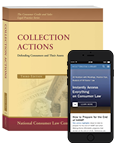Criminal Justice Debt: 2022 Federal Legislative Priorities
Collection Actions
Details consumer defenses to debt buyer and creditor collection lawsuits on credit card, medical, and other consumer debts.
The U.S. criminal justice system disproportionately burdens low-income individuals and people of color, as well as their families and communities. The National Consumer Law Center focuses on the intersection of criminal and consumer law, and their role in equitable criminal justice reform.
Criminal Background Checks
- Issue Brief: Zombie Records: How Sealed or Expunged Court Records in Tenant & Employment Screening Reports May Illegally Cost People Jobs & Housing, Jun. 2022
- Report: Broken Records Redux: How Errors by Criminal Background Check Companies Continue to Harm Consumers Seeking Jobs and Housing, Dec. 2019
COVID-19
- Group letter supporting the inclusion of the COVID-19 Compassion and Martha Wright Prison Phone Justice provisions of HR 6800 in the next COVID-19 package, August 11, 2020
- Written Testimony of NCLC before the Commonwealth of Massachusetts Joint Committee on the Judiciary Supporting H.4652, An Act Regarding Decarceration and COVID-19, May 5, 2020
Criminal Justice Debt
Fact Sheets
- What States Can Do: Criminal Justice Debt, Sept. 2019
Reports & Press Releases
- Report: Collection At All Costs: Examining the Intersection of Mass Incarceration and the Student Debt Crisis, July 27, 2022; Press Release
- Article: Captive Consumers: How government agencies and private companies trap and profit off incarcerated people and their loved ones, Inquest, Mar. 19, 2022
- Research Article: Sentenced to a Life of Debt: It Is Time for a Reassessment of How Bankruptcy Law Intersects with Fines and Fees to Keep People in Debt, Federal Sentencing Reporter, Volume 34, Issue 2-3, December-February 2022
- Report: The High Cost of a Fresh Start: A State-by-State Analysis of Court Debt as a Bar to Record Clearing, Feb. 14, 2022
- Press Release: The High Cost of a Fresh Start: New Report Examines Court Debt as a Barrier to Clearing a Conviction Record, Feb. 14, 2022
- Report: Collecting Criminal Justice Debt Through the State Civil Justice System: a Primer for Advocates and Policymakers, May 2021
- Report: Clearing the Path to a New Beginning: A Guide to Discharging Criminal Justice Debt in Bankruptcy and press release, Oct. 2020
- Report: Commercialized (In)Justice Litigation Guide: Applying Consumer Laws to Commercial Bail, Prison Retail, and Private Debt Collection, June 2020
- Press Release: U.S. House Financial Services Committee Hearing on September 26 on Abusive Debt Collection with Testimony by National Consumer Law Center Attorney April Kuehnhoff, Sept. 25, 2019
- Report: Commercialized (In)Justice: The Growing Problem of Consumer Abuses Perpetuated by Companies Profiting from Mass Incarceration, March 2019
- Report: The Rent-to-Own Racket: Using Criminal Courts to Coerce Payments from Vulnerable Families, Feb. 2019. Press Release
- Report: Criminal Justice Debt in the South: A Primer for the Southern Partnership to Reduce Debt, Dec. 2018
- Press Release: National Consumer Law Center, ACLU & Color of Change Praise Senate Inquiry into Predatory Bail Industry Practices, Aug. 7, 2018
- Report: Confronting Criminal Justice Debt: A Comprehensive Project for Reform, Sept. 2016
A collaborative three-part initiative by the National Consumer Law Center and Harvard Law School’s Criminal Justice Policy Program.
Comments & Testimony
- Support Letter of Ariel Nelson & Caroline Cohn, NCLC’s EJW Fellow, for CA S.B. 1008, the “Keep Families Connected Act,” submitted to the CA legislature’s Senate Public Safety Committee, Mar. 31, 2022
- Support Letter of Ariel Nelson & Caroline Cohn, NCLC’s EJW Fellow, for CA S.B. 1106, “The Fresh Start Act,” submitted to the CA legislature’s Senate Public Safety Committee, Mar. 15, 2022
- Written Testimony of Abby Shafroth & Caroline Cohn, NCLC’s EJW Fellow, before MA Joint Committee on Transportation, supporting an Act to Eliminate Debt-Based Incarceration and Suspensions, Jan. 27, 2022
- Group Comments to the FCC re: Prison Telecommunication Company’s Request for Waiver from FCC Requirements, Jan. 7, 2022
- Written Testimony of Ariel Nelson & Caroline Cohn, NCLC’s EJW Fellow, before MA Joint Committee on Public Safety and Homeland Security, supporting S. 1559, “An Act Relative to Inmate Telephone Calls,” Nov. 2, 2021
- Joint Testimony before MA Joint Committee on the Judiciary in support of H.1900, “An Act Relative to Telephone Service for Inmates in All Correctional and Other Penal Institutions in the Commonwealth,” and before the MA Joint Committee on Public Safety in support of S.1559, “An Act Relative to Inmate Telephone Calls,” Oct. 19, 2021
- Testimony of NCLC attorney Ariel Nelson before the MA Joint Committee of the Judiciary supporting H. 1900: an Act Relative to Telephone Service for Inmates in All Correctional and Other Penal Institutions in the Commonwealth, Oct. 18, 2021
- Group Comments to the FCC re: Rates for Interstate Inmate Calling Services, Sept. 27, 2021
- Comments to Massachusetts Bay Transportation Authority re: Proposed Fare Evasion Regulations 703 CMR 5.00, Apr. 30, 2021
- Testimony of NCLC attorney April Kuehnhoff before the U.S. House Financial Services Committee re: Examining Legislation to Protect Consumers and Small Business Owners from Abusive Debt Collection Practices, Sept. 26, 2019, Press Release
Discusses the Debt Collection Practices Harmonization Act (H.R. 3948), which would ensure that individuals with criminal justice debts are protected from unfair and abusive debt collection practices by private companies. - Written Testimony of Brian Highsmith, NCLC’s Skadden Fellow, before Before the Judiciary Committee of the Connecticut General Assembly, 2019 Regular Session, Mar. 25, 2019
- Written Testimony of Brian Highsmith, NCLC’s Skadden Fellow, before New York State’s Department of Financial Services, Division of Consumer Protection and Division of Criminal Justice Services, Bail Bond Reform Listening Session, Jun. 11, 2018
Letters
- Group Letter to Congress in Support of the Martha Wright Prison Phone Justice Act, Sep. 19, 2022
- Letter to California Governor Newsom Requesting Signature on Keep Families Connected Act, Sep. 2, 2022
- Group Letter to the U.S. Senate Commerce Committee supporting an amendment to S. 1541, the Martha Wright-Reed Just and Reasonable Communications Act, Mar. 21, 2022
- Group Letter urging the CA Franchise Tax Board to suspend tax refund offsets for collection of state and local debts, Mar. 18, 2022
- Group Letter urging the FCC to reduce phone call costs for people who are incarcerated and to ensure accessible communications for incarcerated people with disabilities, Dec. 17, 2021
- Group Letter to U.S. House Subcommittee on Communications and Technology re: the Martha Wright Prison Phone Justice Act, Oct. 6, 2021
- Group letter to Department of Justice Requesting Updated Guidance on Juvenile Fees and Fines, Jun. 8, 2021
- Group letter to Biden-Harris Administration on Fines and Fees Reforms, April 7, 2021
- Group letter to the FCC urging adoption of final rules to reduce the cost of phone calls for the incarcerated and their families, November 23, 2020; Reply letter, January 22, 2021
- Group letter urging Connecticut Legislative Office to pass legislation to stop charging families for prison phone calls, September 17, 2020
- Group letter urging U.S. Senate to include Prison Phone Justice in Next Stimulus Package, September 10, 2020
- Group letter urging Massachusetts legislators to pass No Cost Calls legislation, S. 2846, September 3, 2020
- 130 groups Call for a Nationwide Moratorium on Juvenile Fees and Fines, May 13, 2020
- Coalition letter in Support of the Martha Reed Wright Just and Reasonable Communications Act of 2019, S.1764, June 11, 2019
Webinar Archive
- Litigating Bail Cases: Using Consumer Laws to Challenge Commercial Bail Industry Practices, July 23, 2020
- Driving with Debt: What Attorneys and Organizers Can Do to Address the Problem of Driver’s License Suspensions for Court Debt, January 31, 2019
- Confronting Criminal Justice Debt Free Webinar Series (cosponsored by The National Consumer Law Center and the Criminal Justice Policy Program at Harvard Law School):
- Confronting Criminal Justice Debt: Introduction and Impact on Communities of Color, Oct. 4, 2017
- The Advocacy Gap: Meeting the Urgent Need for Counsel to Represent Individuals in Criminal Debt Proceedings, Oct. 10, 2017
- Using Bankruptcy Law to Aid Criminal Justice Debtors, Oct. 17, 2017
- Introduction to Harvard’s Criminal Justice Policy Program’s 50-State Criminal Justice Debt Law Web Tool, March 1, 2018
- Ensuring that People Are Not Jailed Due to Poverty: Reforming Policies and Representing Clients in Criminal Justice Debt “Ability to Pay” Proceedings (May 22, 2018)
- Affirmative Litigation of Criminal Justice Debt Abuses-Theory and Practice (March 16, 2018)
- Confronting Criminal Justice Debt: Introduction and Impact on Communities of Color, Oct. 4, 2017
Litigation
Tools & Resources
- Bail & Corrections Industry Abuses Litigation Tracker (Last updated Sept. 2020)
- Commercialized (In)Justice Litigation Guide: Applying Consumer Laws to Commercial Bail, Prison Retail, and Private Debt Collection, June 2020
Cases
- Crain & Serna v Accredited Surety and Casualty Co., et al., Case No RG1900-4509 Complaint and Pres
s Release
NCLC has filed a class-action lawsuit, with our partners at Lieff Cabraser Heimann & Bernstein LLP, Justice Catalyst Law, Public Counsel, and Towards Justice, in which we are challenging a scheme to inflate the price of bail premiums in the state of California. The lawsuit was filed in California state court on Jan 29, 2019, against the surety companies that underwrite bail bonds and the state and national trade associations representing the bail bond industry. Plaintiffs allege that an unlawful antitrust conspiracy has kept bail bond premiums higher than they would be if the California bail-bonds market functioned competitively. This scheme, ongoing since at least 2004, has not only made bail bonds costlier for California consumers, but also resulted in more people spending time in jail while awaiting trial–separated from their families, jobs, and lives. The suit seeks damages for the hundreds of thousands of Californians who have overpaid for unlawfully inflated bail bond premiums and also injunctive relief to end the overcharges going forward. - Pearson et al v Hodgson and Securus Technologies, Inc, Case No. 18-1360, Complaint and Press Release
- Egana v Blair’s Bail Bonds, Inc. Case No. 2:17-cv-5899 First Amended Complaint
Plaintiffs, an accused and others who agreed to indemnify the bail bond company in case of loss, filed this action on behalf of themselves and all individuals whose rights under federal and state law were violated when they contracted with Defendants for a bail bond to secure their own or their loved ones’ release from jail. The Amended Complaint describes the process through which Defendant bail bond company agreed to allow plaintiffs to finance the premium for the bond, but utilized contracts that violate the Truth in Lending Act, 15 U.S.C. § 1601 et seq. by failing to make necessary disclosures, and state contract, conversion, and usury laws by requiring payment of amounts above what state law allows, including paying daily fees for ankle monitors supplied by another company. The FAC also alleges that Defendants violated the Racketeer Influenced and Corrupt Organizations Act, 18 U.S.C. § 1962 (RICO) and the Louisiana Racketeering Act, La. Stat. Ann. § 15:1351, by conspiring to employ or contract with bounty hunters to kidnap, detain, and threaten to jail principals unless they or their loved ones paid money that was distributed between Defendants. NCLC’s co-counsel are The Southern Poverty Law Center and the firm of Wilmer Hale
Amicus Briefs
- Amicus Brief supporting Caldwell in BBBB Bonding Corp. v. Caldwell, Aug. 25, 2021
- Amicus Brief supporting Plaintiff in Scholl v. Mnuchin, Aug. 21, 2020
| For Attorneys: | |||
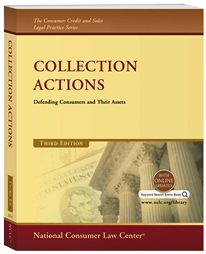 Collection Actions Collection Actions |
Continuing updates and additional information concerning criminal justice debt will be available for subscribers to this legal treatise. |
||
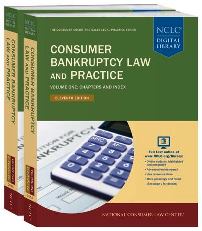 Consumer Bankruptcy Law and Practice Consumer Bankruptcy Law and Practice |
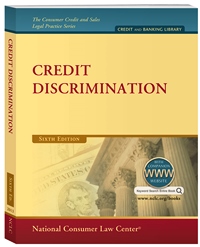 Credit Discrimination Credit Discrimination |
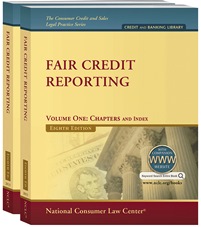 Fair Credit Reporting Fair Credit Reporting |
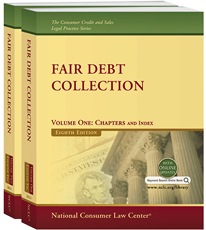 Fair Debt Collection Fair Debt Collection |
| For Consumers: | |||
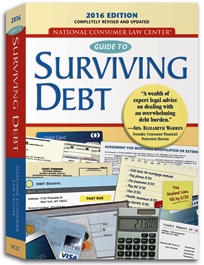 Guide to Surviving Debt Guide to Surviving Debt |
|||

